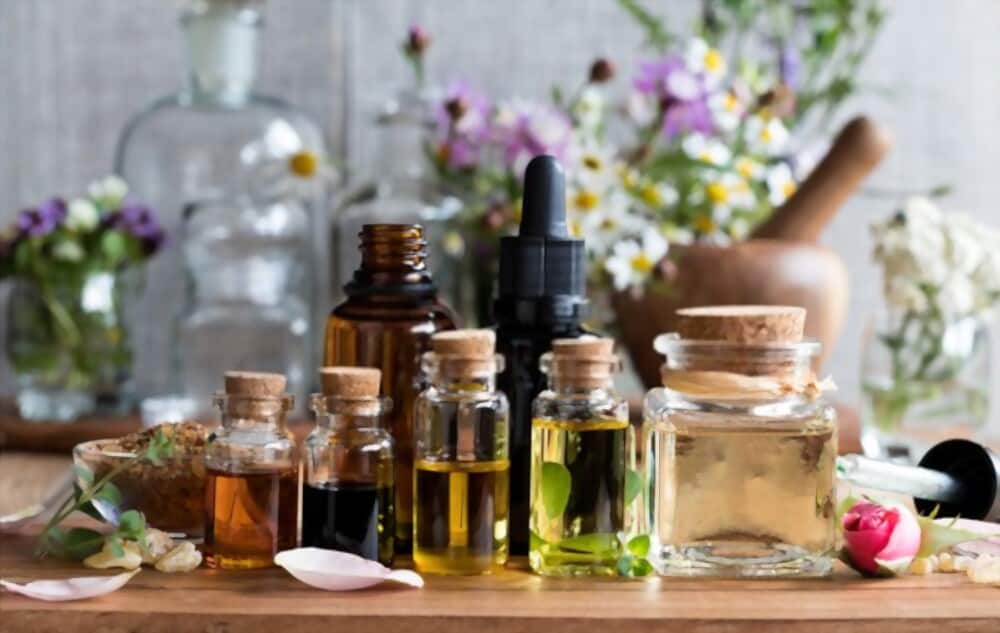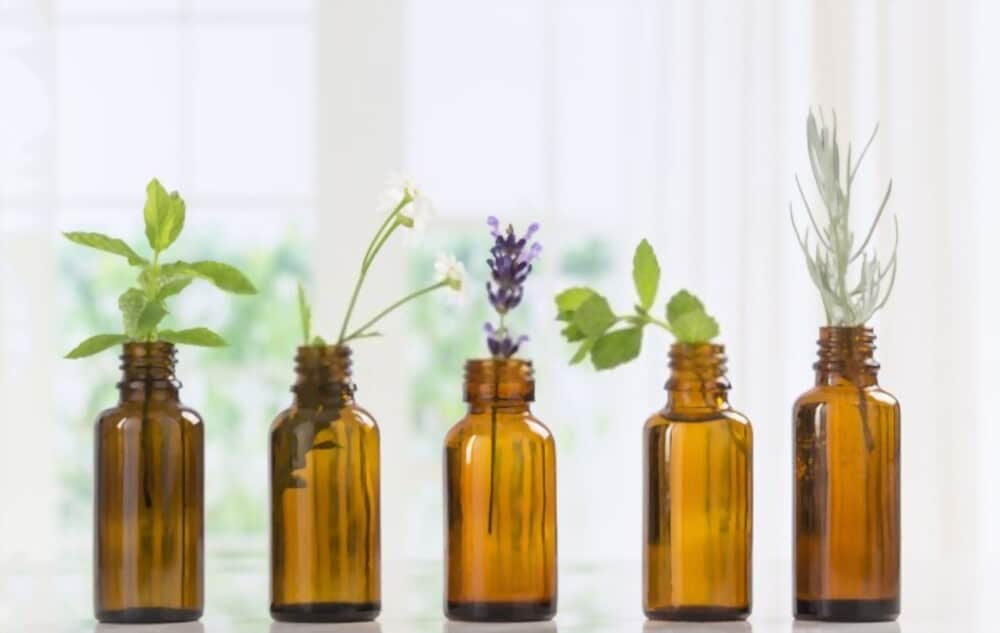
Although the idea of applying essential oils on plants might sound strange, it is actually extremely straightforward and has several advantages.
In addition to helping you get rid of pests from your plants, using essential oils on them can promote development and improve the natural appearance of any indoor gardens you may have. Some essential oils can damage plants if they are applied improperly or in high quantities.
You’ll discover what kinds of essential oils are beneficial to plants, their advantages, and how they’ll effect your plants’ growth in this post. I’ll also give you guys the recipe for an extremely potent essential oil plants spray that will benefit your plants in a variety of ways.
Table of Contents
What type of Essential oil is Good for Plants?
I’ll include a few of the greatest essential oils for plants along with their advantages and a few other things. Let’s start.
Peppermint Oil:
Using peppermint oil to prevent infestation is generally effective. Because of how strongly it irritates spider mites, peppermint-oiled plants are better protected from them.
Additionally, you can apply the oil to your houseplants and observe the outcomes for yourself. On the other hand, avoid applying too much to the plants because an overdose is poisonous to both plants and people.
Keep a few drops of peppermint oil around your home if you wish to try this procedure on your own. Pests will avoid the odour. Simply sprinkle some peppermint oil about your plants and on their leaves to let it do its magic!
Clove Oil:
When you detect any fungus growth, this oil is fairly trustworthy. Basically, clove oil has a reputation for dissolving things. This prevents any fungi from growing on your facility or its grounds.
Additionally, it decomposes fairly quickly, causing little to no harm to the plants. Plants with clove oil on them are less appealing to cockroaches, ants, or other insects.
Cajeput Oil:
Typically, cajeput oil is used to protect plants from garden pests. Cajeput oil performs its function on indoor plants rather admirably and is frequently used for them.
Thyme Oil:
Thyme oil is what you should apply on your plants if you’re sick of unneeded diseases and insects wreaking havoc on your indoor and outdoor plants.
In other words, it aids in preventing insects, caterpillars, and other mites from contaminating your plants. Additionally, the oil has advantages for people as well as plants. The aroma of the oil works well to improve memory.
Rosemary Oil:
Spider mites are a major factor in the harm that your plants sustain. You can permanently get rid of the issue by using rosemary oil.
The aroma of the rosemary oil attracts pollinators, who are quite drawn to it.
Cats occasionally even urinate directly on the plants in your garden. But when you apply the rosemary oil to them, the cats won’t do that again.
The aroma of this oil is so alluring that it will draw butterflies and other lovely creatures to your plants.
Catmint or Catnip Oil:
Sometimes, catnip or catmint oil works as an insecticide. It maintains the plants generally secure and healthy by keeping hazardous insects away from them.
The aroma of catnip attracts beneficial insects, such as pollinators, who then benefit the plants.
Lavender Oil:
It is quite good in healing plants and has solid germ-repelling characteristics.
One of the most well-known and frequently used essential oils on plants is lavender oil. In some cases, butterflies are also attracted to the plants by its aroma.
Lavender oil, which is often referred to as a general repellent, aids in preventing hazardous and unwelcome mites, bugs, and other insects from landing on your indoor and outdoor plants.
By enhancing the air quality everywhere around them, it also keeps your plants healthy. This oil can be sprayed straight into your plant’s leaves or combined with water to cover the entire plant.
Yarrow Oil:
If you want to apply yarrow oil to your plants, keep in mind that the color will be obvious because it is blue. Since shampoo frequently contains this oil, you could assume that it smells wonderful.
The plants gain several advantages from the pollinators that are attracted by that wonderful aroma from the surroundings. You can also use this oil into hair care products.
Basil Oil:
Basil oil is advantageous for plant growth because pollinators are attracted to plants that have basil oil since it has one of the best essential oil scents.
The attractive aroma of essential oils is a result of the secretory structures from which they are composed. Since butterflies and other insects are drawn to the plants, basil oil is no exception.
Sage Oil:
Sage oil is beneficial for plants, but you shouldn’t use too much of it. The fact that this oil has a distinctive aroma that draws pollinating insects like butterflies doesn’t change as a result.
Additionally, sage oil can deter a variety of bugs, flies, and other pesky insects. Anxiety and despair are thought to be treated by its smell. I assume that’s good news.
Melaleuca or Tea Tree Oil:
Again, make sure to put the right amount of tea tree oil on your plants because too much of it could burn the leaves. Don’t use it any more often than required.
Additionally, the tea tree oil eliminates the fungus and prevents it from returning to your plants. Once the sun has set, it is advised to apply melaleuca oil to the plant leaves.
Orange Oil:
Given that its wonderful aroma attracts pollinators to the plants, making it one of the safest oils to use on your plants.
To improve the performance of the soil, combine freshwater and orange oil. The oil protects the plants by keeping insects and pests away.
Cedarwood Oil:
Many different types of insects, including bugs, pests, and others, are repelled by cedarwood essential oil. Because it suffocates the insects and finally releases them from your plants, it is also known as a molluscicide.
Cedarwood can readily concentrate on its growth and development while it is functioning. Additionally, it can aid in reducing stress and worry. So that’s another positive.
Patchouli Oil:
Like a hidden jewel, it is not a well-known oil. You can use it on your indoor plants the most frequently. It keeps vermin, bugs, and other things out. It’s also referred to as a natural repulsant.
On your plants, patchouli oil can help prevent fungal growth. In order to help the plants, its lovely aroma also attracts pollinators.
Spearmint Oil:
Spearmint oil applied to your plants in 15 to 20 droplets also serves as a bug deterrent. Additionally, its lovely smell relieves stress and despair.
Since it is completely safe to use, you are allowed to do so mostly inside of your homes. One of the best essential oils also has the ability to rid your plants of pests and stop fungus from growing.
What are the Benefits of Essential Oils has on Plants?

The aforementioned essential oils are all quite good at keeping pests at bay. The best ones include citronella oil, peppermint oil, lavender oil, tea tree oil, and a few others.
By using these oils, you can keep pests at bay and stop fungus from forming on your plant.
One thing to keep in mind, though, is that if you use these oils more frequently than is necessary, your plants will suffer the consequences.
Additionally, applying essential oils can promote plant development and enhance their overall appearance. Essential oil nutrients are thought to promote plant growth.
Do Essential Oils Affect Plant growth and How?
They do, in fact, influence plant growth. How? So it has both positive and harmful effects.
Positive Effect:
The luster of plant leaves is enhanced when the essential oils are applied. Their distinctive aroma attracts pollinators to the plants from the surroundings.
The aroma of the oil mixes with the air as the plants purify it, making the air fragrant.
Negative Effect:
Keep in mind that applying more essential oils to plants than necessary will prevent air and sunlight from properly reaching the plants or plant leaves due to the heavier covering of essential oils.
Without photosynthesis, which cannot occur in the absence of air or sunlight, plants cannot carry out their essential function.
Essential Oil Plants Spray Recipe:
You can produce the essential oil plant spray at home because the recipe is so straightforward. For this, only a few simple things are required.
- 20 drops or less of any essential oil (peppermint or lavender oil, most probably).
- filtered water.
- 1 to 2 tablespoons of grain alcohol, such as Everclear.
- 2 or 3 ounce spray bottles.
Once you have all the materials, just combine 20 drops of your favorite essential oil (such as lavender or peppermint oil) with one or two spoons of grain alcohol (Everclear, most probably).
After combining the two items, fill the spray container to the top with water. It should be properly jerked and closed from above. You may proceed now. Simply shake it once or twice whenever you want to use it and then use it as needed.
How to Use Essential Oils on Plants?
Simply mist the plants and plant leaves with the prepared essential oil spray. The result will be shinier leaves that change the appearance of the plants.
Additionally, avoid spraying a specific area of the plant more than twice or three times, as this will affect the plant’s growth and health.
- Applying essential oils should be done once or twice a week, giving the aroma time to dissipate after each application.
Can You Use Essential Oils on House Plants?
Yes, most certainly. Some essential oils have a potent fragrance that treats sadness or anxiety.
People that give their house plants essential oils tend to have happier houses since they have fragrant plants.
Conclusion:
It is advantageous for plants’ growth and development to use essential oils on them. Many essential oils are thought to be beneficial for plants, including thyme, clove, rosemary, lavender, yarrow, catnip, basil oil, and peppermint.
– Lavender. Calming and relaxing, decreasing general discomfort. … – Lavender. Calming and relaxing, decreasing general discomfort. …
Additionally, applying essential oils can help plants develop and look better overall. Essential oil nutrients are thought to aid in the growth of plants.
